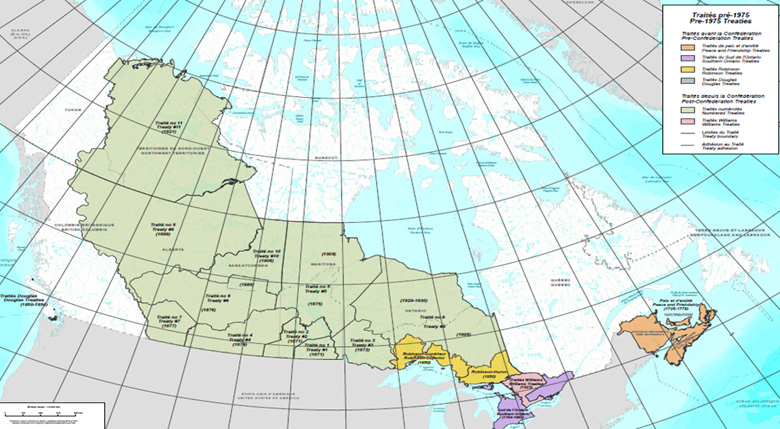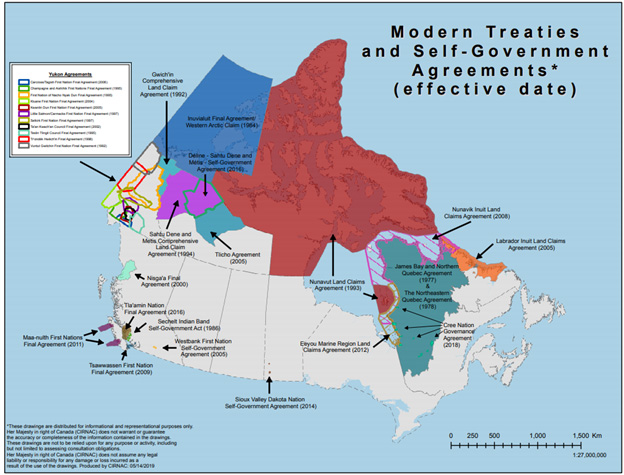Book 2, Tab B2 - Crown-Indigenous relationship overview
On this page
- Purpose
- DFO has important relationships with Indigenous peoples
- Indigenous priorities and expectations
- DFO’s relationships with Indigenous peoples have changed over time and have a strong regional and operational dimension
- The Department has a range of tools to support renewed relationships and partnerships and is enhancing existing tools and developing new approaches to support the implementation United Nations Declaration on the Rights of Indigenous Peoples Action Plan in line with partners aspirations
- Key areas of work moving forward
- Annex A: Court decisions and treaty obligations
- Annex B: Map of “Historic Treaties” (pre-1975)
- Annex C: Map of Comprehensive Land Claim Agreements and Self-Government Agreements (“Modern Treaties”)
- Annex D: Duty to consult
Purpose
- Provide an overview of Indigenous rights and how they pertain to the Department's mandate and relationships with Indigenous Peoples
- Outline departmental initiatives and programs supporting Indigenous rights, interests and relationships
DFO has important relationships with Indigenous peoples
The Minister of Fisheries and Oceans is responsible for:
- Fish access and allocation, including to Indigenous communities and organizations
- Management of Indigenous fisheries
- Decisions on major project proposals
- Responding to litigation involving Indigenous rights
- Negotiating and implementing treaties and time-limited rights recognition agreements
Fisheries in Canada are…
- Of great social, cultural, and economic significance to many Indigenous communities
- A public resource to which Indigenous peoples have unique rights and interests
- An important focus at Treaty and other negotiating tables
- An economic driver and opportunity for self-determination for Indigenous peoples
Spotlight: Coast Guard
The CCG works in partnership with Indigenous coastal communities to ensure marine safety. In particular, some Indigenous communities play a key role in the Coast Guard Auxiliary by responding to emergencies in their local waters.
Indigenous priorities and expectations
DFO is seeking to deliver results in the context of high expectations from Indigenous Peoples for increased and diversified economic opportunities and a greater role in decision-making and management activities, including:
- More access to fish for FSC and commercial purposes as well as aquaculture opportunities
- Flexibility to choose how to fish
- Means with which to harvest, add value, grow, and diversify economically
- More control in their traditional territories and waters through joint or shared decision-makingand
- More direct involvement in fisheries, oceans, aquatic habitat, and marine waterways management activities
DFO’s relationships with Indigenous peoples have changed over time and have a strong regional and operational dimension
From a relationship built on responding to rights recognized through court decisions related to fisheries
- Policies and programs that supported collaborative management and increased fish access (e.g., Aboriginal Fisheries Strategy/Allocation Transfer Program, Marshall Response Initiative) and
- Rights-based discussions at mainly Treaty negotiating tables
To proactively building relationships that enable the expression of rights and interests across an array of activities.
- New programs have been proactively introduced (e.g., Atlantic, Pacific, and Northern Integrated Commercial Fisheries Initiatives)
- Since 2015, collaborative management programs have invested an average of approximately $65 million per year
- Continued implementation of the Marshall decision (moderate livelihood) with 34 First Nations in the Maritimes and Gaspé region, and now also the Peskotomuhkati, including a new optional path for First Nations in the Maritimes and the Gaspé region to develop and implement their own moderate livelihood fishing plan (2021)
- Negotiating tables have moved toward the recognition of rights and interests as a starting point for negotiations
North:
- The North is mostly covered by comprehensive land claim agreements and self-government agreements (“modern treaties”)
- DFO-Indigenous relationship in the North is primarily related to implementing these agreements
East:
- Implementing court decisions for FSC fishing and the right to fish for commercial purposes (moderate livelihood) in specific locations and circumstances
- Some historic treaties and three Modern Treaties (Quebec and Labrador) - some Indigenous groups are currently negotiating time-limited agreements
Inland:
- Inland area is largely covered by pre-1975 treaties with First Nations (“historic treaties”)
- Provinces and territories manage inland fishing – including Indigenous fishing - in most cases, while inland aquatic habitats remain under federal jurisdiction
West:
- Implementing court decisions for FSC fishing and the right to fish for commercial purposes in specific locations and circumstances
- Few existing treaties - some Indigenous groups are currently negotiating time-limited agreements
The Department has a range of tools to support renewed relationships and partnerships and is enhancing existing tools and developing new approaches to support the implementation United Nations Declaration on the Rights of Indigenous Peoples Action Plan in line with partners aspirations
Indigenous Programs
Includes a range of programs such as the Atlantic, Pacific, and Northern Integrated Fisheries Initiatives and the new Indigenous Habitat Protection Program.
Policy and legislation
Encompasses legislative reviews, policy initiatives, and specific decisions that may affect Aboriginal and Treaty rights and interests.
Treaty negotiations
Generally, address issues such access/allocations (e.g., pursuit of moderate livelihood), collaborative management, and oceans management.
Non-treaty negotiations
Includes tools such as self-determination discussions and agreements; collaborative science and, litigation-related negotiations.
Engagement/consultation
Touches on fisheries management plans and activities; marine safety and emergency response; science; fisheries and habitat protection; and marine use planning.
Meaningful change
Changes sought to fisheries and marine safety legislation, regulations, and policy that provide for more meaningful implementation of Indigenous fishing rights and decision making in the marine safety regime.
Collaboration
New mechanisms and agreements in the management of fisheries, the protection of fish habitat and marine safety that allow for collaborative governance and shared decision-making.
Capacity funding
The need for long-term capacity and support for partners through our Indigenous programs is another key theme that has emerged.
Voice at the table
Consideration of Indigenous Knowledge for decision-making for fisheries and oceans management and marine safety.
Key areas of work moving forward
- Participating in fisheries, oceans, aquatic habitat, and marine waterways negotiations at over 50 negotiation tables
- Exploring new approaches for fisheries collaborative management in partnership with Indigenous groups
- Developing internal and external capacity for ongoing collaboration with Indigenous partners
- Implementing the DFO-Coast Guard Reconciliation Strategy and accompanying results model
- Develop approaches to ensure we are meeting United Nations Declaration on the Rights of Indigenous Peoples (UNDRIP) obligations
- Advancing UNDA Action Plan initiatives
Annex A: Court decisions and treaty obligations
Court decisions:
Indigenous peoples have an Aboriginal right to fish for food, social and ceremonial purposes (FSC)
Indigenous peoples have an Aboriginal right to fish for commercial purposes in specific circumstances
Treaty obligations:
Fisheries-related issues are often a key component of treaty negotiations
Fisheries and Oceans Canada works to implement over 2,700 obligations arising from 25 modern treaties.
See Annexes B and C for more information on historic and modern treaties
Annex B: Map of “Historic Treaties” (pre-1975)

Description:
Pre-1975 Treaties
- Pre-Confederation treaties
- Peace and friendship treaties
- Southern Ontario treaties
- Robinson treaties
- Douglas treaties
Post-1975 Treaties
- Numbered treaties
- Williams treaties
- Treaty boundary
- Treaty adhesion
Annex C: Map of Comprehensive Land Claim Agreements and Self-Government Agreements (“Modern Treaties”)

Description:
This map illustrates the amount of Canada's land mass covered by modern treaties and self-government agreements. Note: this map does not include the Deline Self-Government Agreement.
- Newfoundland and Labrador
- Labrador Inuit Land Claims Agreement (2005)
- British Columbia
- Maa-nulth Final Agreement (2011)
- Nisga'a Final Agreement (2000)
- Tla'amin Final Agreement (2016)
- Tsawwassen First Nation Final Agreement (2009)
- Sechelt Indian Band Self-Government Agreement (1986)
- Westbank First Nation Self-Government Agreement (2005)
- Nunavut
- Nunavut Agreement, formerly Nunavut Land Claims Agreements (1993)
- Northwest Territories
- Gwich'in Comprehensive Land Claim Agreement (1992)
- Sahtu Dene and Métis Comprehensive Land Claim Agreement (1994)
- Tlicho Land Claims and Self-Government Agreement (2005)
- Inuvialuit Final Agreement Western Arctic Claim (1984)
- Déline Final Self-Government Agreement (2016)
- Québec
- James Bay and Northern Québec Agreement (1977)
- Northeastern Québec Agreement (1978)
- Nunavik Inuit Land Claims Agreement (2008)
- Eeyou Marine Region Land Claims Agreement (2012)
- Yukon
- Yukon First Nations Final Agreements
- Champagne and Aishihik First Nations (1995)
- First Nation of Na-cho Nyak Dun (1995)
- Teslin Tlingit Council (1995)
- Vuntut Gwitchin First Nation (1995)
- Little Salmon/Carmacks First Nation (1997)
- Selkirk First Nation (1997)
- Tr'ondëk Hwëch'in First Nation (1998)
- Ta'an Kwäch'än Council (2002)
- Kluane First Nation (2004)
- Kwanlin Dün First Nation (2005)
- Carcoss/Tagish First Nation (2006)
- Yukon First Nations Final Agreements
- Manitoba
- Sioux Valley Dakota Nation Self-Government Agreement (2014)
Annex D: Duty to consult
Government is subject to the constitutional duty to consult and accommodate, and the requirement to justify any infringements of rights.
Duty to consult
Where the Crown contemplates conduct that might have an adverse impact on established or potential Aboriginal or treaty rights, it has a legal duty to consult with those Indigenous groups who hold (or potentially hold) those rights, and, where appropriate, accommodate their interests or concerns.
Duty to justify infringements of rights
Where legislation, its implementation or other government action infringes an Aboriginal or treaty right, the infringement must be justified in accordance with the test set out by the Supreme Court of Canada.
- Date modified: